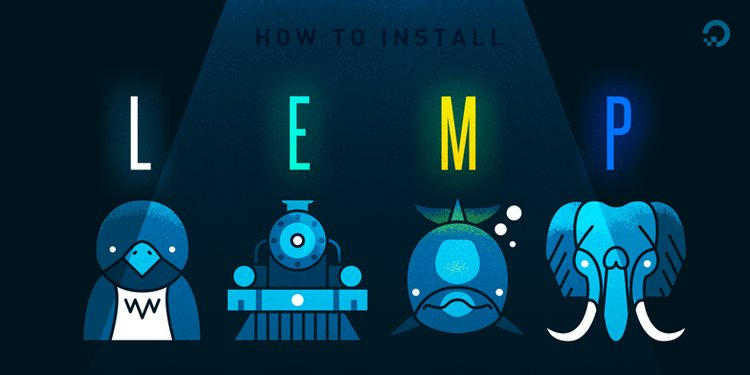A Guide to the Latest Versions and Endless Freshness: Nginx, MariaDB, and PHP
Introduction: A Stack for the Modern Era
In the vast realm of web server configurations, the LEMP stack stands tall, comprising Nginx, MariaDB, and PHP. This guide is not just another outdated tutorial; it’s your ticket to a perpetually up-to-date LEMP stack. No matter which Debian version you embrace, this guide ensures your web server components are always fresh, with Nginx and PHP 8.1 leading the charge.
The LEMP Stack Unveiled: A Symphony of Nginx, MariaDB, and PHP
Why Nginx and MariaDB, you ask? Personal preference plays a role, but the focus here is on a configuration that enables the use of the latest versions of each program. While stability is crucial, the desire for the cutting edge led me to this setup. The following steps guarantee a robust stack, but remember, what works for one may need tweaking for another.
Step 1: Install Necessary Packages
sudo apt install curl gnupg2 ca-certificates lsb-release debian-archive-keyringStep 2: Set Up Repositories
Before configuring your server’s repository, identify your Debian version’s codename using:
sudo lsb_release -scFor a detailed system overview:
sudo lsb_release -aExample result:
Distributor ID: Debian
Description: Debian GNU/Linux 12 (bookworm)
Release: 12
Codename: bookwormUse the codename in the subsequent configuration.
Nginx: Embrace the Latest
Download Signing Key and Add Repository
curl https://nginx.org/keys/nginx_signing.key | gpg --dearmor \
| sudo tee /usr/share/keyrings/nginx-archive-keyring.gpg >/dev/null
gpg --dry-run --quiet --no-keyring --import --import-options import-show /usr/share/keyrings/nginx-archive-keyring.gpg
echo "deb [signed-by=/usr/share/keyrings/nginx-archive-keyring.gpg] http://nginx.org/packages/debian $(lsb_release -cs) nginx" \
| sudo tee /etc/apt/sources.list.d/nginx.listFor mainline Nginx packages:
echo "deb [signed-by=/usr/share/keyrings/nginx-archive-keyring.gpg] http://nginx.org/packages/mainline/debian $(lsb_release -cs) nginx" \
| sudo tee /etc/apt/sources.list.d/nginx.listUpdate and install the latest Nginx:
sudo apt update && sudo apt install nginxPHP: Unleash the Power of 8.2
Add Repository and Download Key
sudo sh -c 'echo "deb https://packages.sury.org/php/ $(lsb_release -sc) main" > /etc/apt/sources.list.d/php.list'
sudo wget -O /etc/apt/trusted.gpg.d/php.gpg https://packages.sury.org/php/apt.gpgUpdate and install PHP 8.2:
sudo apt update && sudo apt install php8.2-fpm
sudo apt install php8.2Set up repository pinning for official sources:
echo -e "Package: php*\nPin: origin packages.sury.org\nPin-Priority: 900\n" \
| sudo tee /etc/apt/preferences.d/99phpCheck your PHP version:
sudo php -vExtra PHP Steps
Install additional PHP modules (for WordPress, for instance):
sudo apt install php-bcmath php-curl php-gd php-imagick php-intl php-json php-mcrypt php-mysql php-ssh2 php-xml php-zip php-apcu php-mbstring php-soapMariaDB: The Latest Symphony
Install Required Packages and Add Repository Key
sudo apt install apt-transport-https curl
sudo mkdir -p /etc/apt/keyrings
sudo curl -o /etc/apt/keyrings/mariadb-keyring.pgp 'https://mariadb.org/mariadb_release_signing_key.pgp'Create a MariaDB repository:
sudo nano /etc/apt/sources.list.d/mariadb.sourcesAdd the following content:
# MariaDB 10.11 repository list - created 2023-07-30 13:57 UTC
# https://mariadb.org/download/
X-Repolib-Name: MariaDB
Types: deb
# deb.mariadb.org is a dynamic mirror if your preferred mirror goes offline. See https://mariadb.org/mirrorbits/ for details.
# URIs: https://deb.mariadb.org/10.11/debian
URIs: https://ftp.bme.hu/pub/mirrors/mariadb/repo/10.11/debian
Suites: sid
Components: main
Signed-By: /etc/apt/keyrings/mariadb-keyring.pgpUpdate and install MariaDB:
sudo apt update && sudo apt install mariadb-server mariadb-client mariadb-backupConfigure MariaDB using the installation wizard:
sudo mariadb-secure-installationExtra Steps for a Seamless Setup
SSL for Added Security
Consider adding a free Let’s Encrypt certificate for secure communication. Refer to the Encrypt SSL Cert for Nginx guide for detailed instructions.
Nginx Configuration Tweaks
Adjust the Nginx configuration:
sudo nano /etc/nginx/nginx.confEdit or add the line:
keepalive_timeout 2;If you encounter port binding errors after installation or restart, resolve them with:
sudo fuser -k 80/tcpPHP FPM: The Preferred Process Manager
If PHP FPM is your favored PHP process manager, edit your website configuration:
sudo nano /etc/nginx/conf.d/default.confChange the line with the PHP section:
location ~ \.php$ {
try_files $uri =404;
include /etc/nginx/fastcgi_params;
fastcgi_pass unix:/var/run/php/php8.2-fpm.sock;
fastcgi_index index.php;
fastcgi_param SCRIPT_FILENAME $document_root$fastcgi_script_name;
fastcgi_split_path_info ^(.+\.php)(/.+)$;
}Edit php.ini:
sudo nano /etc/php/8.2/fpm/php.iniChange the cgi.fix_pathinfo option:
cgi.fix_pathinfo=0Adjust the web server user for PHP:
sudo nano /etc/php/8.2/fpm/pool.d/www.confFind the parameters listed below and set them accordingly:
user = nginx
group = nginx
listen = /run/php/php8.2-fpm.sock
listen.owner = nginx
listen.group = nginxReload the PHP FPM service:
sudo systemctl reload php8.2-fpmPHP Info for Configuration Check
Create an info.php file in your web root:
sudo nano /var/www/html/info.phpAdd the following code:
<?php
phpinfo();
?>Access the file in your browser:
Remember to delete the file when no longer needed.
Conclusion: A Future-Proofed LEMP Stack
Congratulations! Your LEMP stack, comprising the latest Nginx, PHP 8.2, and MariaDB, is now a fortress of modernity. Enjoy the benefits of a perpetually fresh configuration, ensuring your web server is ready for whatever the internet throws its way.

